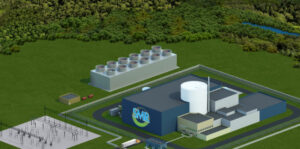THE US Nuclear Regulatory Commission (NRC) expects increased engagement in nuclear safety with the Philippines, and also sees the latter’s development of a nuclear power industry attracting interest from US companies.
The two countries have entered into a civil nuclear cooperation agreement, paving the way for the US to export nuclear fuel and equipment.
NRC Chairman Christopher T. Hanson said the US-Philippines Agreement for Cooperation Concerning Peaceful Uses of Nuclear Energy, also known as the “123 Agreement,” took effect on July 2, unlocking more cooperation from the US.
“I think you’re going to see an increase in the activity and the support that the NRC is going to be providing to the Philippine Nuclear Research Institute (PNRI) and its successor organization as the regulatory body,” Mr. Hanson said in a media roundtable on Thursday.
Mr. Hanson is on a two-day trip in the Philippines to meet with Department of Energy (DoE) officials and other officials to discuss US support for the Philippines’ civil nuclear program.
He met with Rep. Mark O. Cojuangco, who chairs the House committee on nuclear energy, to discuss enabling legislation to set up the Philippine nuclear regulator.
He said the NCR will bring three PNRI experts to the US for training in nuclear power engineering and will organize a workshop for nuclear power executives.
“I hope these will enable the Philippines to think about how they might like to pursue the development of their regulatory body,” he said.
Asked about the readiness of the Philippines for nuclear energy, Mr. Hanson said that the Philippines has a strong foundation.
“My view is that the Philippines has a really strong foundation. The Philippine government already regulates the safety and security of radioactive materials for the healthcare and agriculture industries,” he said.
He added that the country has qualified and highly educated workers all over the world who are “ready to come home and support the nuclear program.”
“So, I think there are a lot of really strong things, and the reason for my visit is to talk to officials in the DoE here in the Philippines as well as the PNRI about what their priorities are for developing that nuclear safety framework,” he said.
The 123 Agreement, signed by Washington and Manila in November last year, provides a legal framework for the export of nuclear materials, equipment, and components from the US to the Philippines.
It permits the transfer of information, nuclear material, equipment, and components directly between the Philippines and the US to support potential nuclear power projects with US suppliers.
With the 123 Agreement in place, Mr. Hanson said that the NRC is willing to share its analysis of the licensed nuclear technology that a US company may offer for deployment in the Philippines.
“We can show how we went through that licensing process and performed the technical and confirmatory analyses to reach our determinations,” he said.
“But I want to really stress, though, that it is important, and it’s my goal to help support and develop regulatory bodies here in the Philippines and in other countries who are capable of performing those analyses themselves,” he added. — Justine Irish D. Tabile
